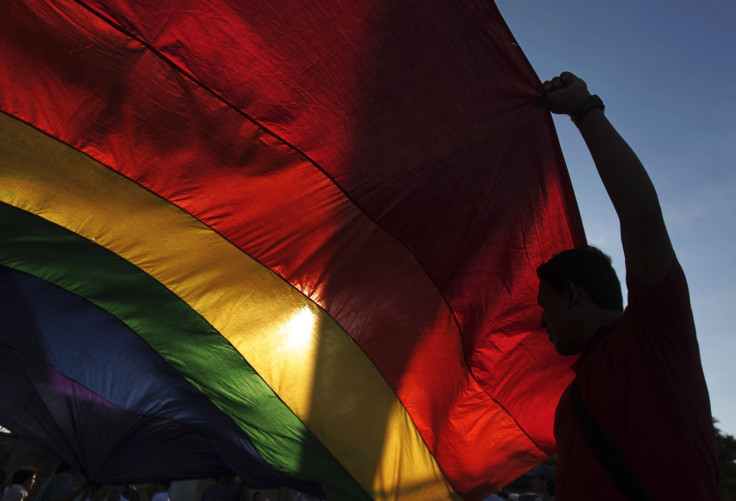
"I came to the United States because I wasn’t sure I could live an open life in Colombia," says Andres Duque, "I came here because I wanted to live an open life." Duque works at the Queens Pride House in New York City, which has been supporting LGBT Latinos in New York for over sixteen years. Duque's story is not uncommon: over the years, thousands of Latinos have come to the United States in search of a better life, a better future, a more accepting home.
For many, coming to the United States meant arriving in a more open, accepting society. For others, however, it was a matter of life and death. According to Professor Rogério Meireles Pinto at Columbia University’s School of Social Work, "many people came here from Latin America in order to survive." Professor Pinto specializes in HIV research and in his early years as a case worker in the 90s, he came across numerous immigrants who had come to New York in search of life-saving antiretroviral drugs.
LGBT Latinos not only survived, but made a life for themselves here in America. For many, this included falling in love. Buzzfeed recently published a story about Venezuelan couple Pablo García Gámez and Santiago Ortiz who met and fell in love in Venezuela but moved to the United States for work. Their relationship, however, has been constantly put under pressure by Pablo's undocumented status - for them, fear of deportation has been incredibly real.
Like Pablo, there are thousands of LGBT Latinos who are undocumented and must face daily hardship. According to UCLA's Williams Institute, there are an estimated 267,000 LGBT-identified individuals in the United States who are undocumented. Of those, 71 percent are Hispanic. That number is truly staggering. This means that there are nearly 200,000 people in this country who must not only face the prejudice of being LGBT, but also the fundamental lack of rights that come with being undocumented.
As Shelby Chestnut from the New York City Gay and Lesbian Anti-Violence Project explains, being LGBT often means a difficult collision of various identities: “Latino and Latina communities are targeted because of immigration status in addition to an LGBT identity.” Thus there is a fear among Latinos of accessing services because the fear of deportation is so real: “particularly in domestic violence situations where people will stay in abusive relationships because the fear of deportation is so real that they’re terrified to call the police.”
Similarly, Chestnut suggests, transgender Latina women are more likely to be profiled by the NYPD because their Latina and trans identities intersect in a very physical, outward manifestation. Transgender Latinas also face significantly more violence from the general public: people who identify as transgender are 28 percent more likely to experience physical violence. A study of murders against people of the LGBT community found that 87 percent of victims were people of color.
The National Center for Transgender Equality (NCTE), the National Gay and Lesbian Task Force, and the League of United Latin American Citizens (LULAC) released "Injustice at Every Turn: A Look at Latino/a Respondents in the National Transgender Discrimination Survey," revealing that transgender Latino/a people face poverty, unemployment, homelessness, discrimination and violence at significantly higher rates than both the overall transgender population and the general population.
LGBT Latinos also face greater problems when it comes to HIV. According to the Center for Disease Control, “new HIV infection rate among Hispanics/Latinos in 2010 in the United States was more than 3 times as high as that of whites.” The CDC explains that “fear of disclosing immigration status and possible deportation” as well as “socioeconomic factors such as poverty, migration patterns, lower educational accomplishment (and) inadequate or no health insurance,” contribute to wide increases in HIV infection among Latinos.
The problem is thus endemic. Without proper legal status, LGBT Latinos and Latinas cannot access the necessary services to improve their lives and will continue to be at the center of violence and discrimination.
As the LGBT Dreamers Fund explains, "the current broken system harms, scapegoats and vilifies all immigrants, regardless of their sexual orientation or gender identity, and their friends and families. In many areas, such as detention, asylum, labor and marriage, the system disproportionately harms LGBT people. For these reasons, comprehensive federal immigration reform is an urgent priority for our nation and the LGBT community."
Change is happening, however. The reppeal of DoMA was a huge moment for many LGBT Latinos: for couples like Santiago and Pablo, it means hope for their future. For Heriberto Sanchez Soto, the Executive Director at New York’s Latino Pride Center, marriage equality is “a way for those who are struggling with their legal status to find a way into the fabric of society.” At last, LGBT Latinos in many states will have a right long denied to them: to use love as a pathway to legal status.
The collision of LGBT rights and immigration rights have also allowed for a stronger, more united voice in the Latino community as both movements intersect. Celso Cardenas from the Association of Latinos/as Motivating Action (ALMA) in Chicago has formed the "Immigration Coalition to make sure that LGBTQ Latinos have a voice.”
Likewise, the DREAMers movement has often utilized the language and discourse of the LGBT rights movement: one need only look at the amount of stories circulating recently of young Latinos and Latinas, LGBT or otherwise, 'coming out' as undocumented to see that this is the case. Much like the LGBT movement, the DREAMers movement has focused on visibility as a means of achieving progress.
Despite recent advances, there is still an enormous road ahead. Without comprehensive immigration reform, millions of Americans, LGBT or not, Latino or otherwise, will face constant hardship. Eliminating discrimination for one community is a huge step in eliminating discrimination for all.
© 2025 Latin Times. All rights reserved. Do not reproduce without permission.




